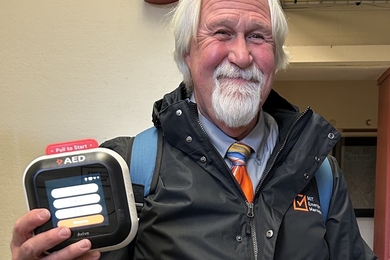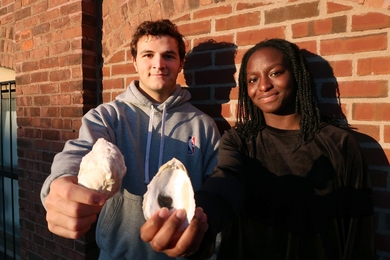A flair for computer repairs
IS&T's Walk-In Help and Service Center in Building N42 handles computer repairs, consulting and troubleshooting. With cross-trained staff and a simplified pricing structure, this single "front door" at 211 Massachusetts Ave. makes it easy for community members to get expert diagnosis and help. You don't need to know whether your computer problems are caused by a hardware malfunction, corrupted operating system, virus--or a combination of factors.
Call the Computing Help Desk at 617-253-1101 to talk to a consultant before bringing your computer to N42. Depending on the nature of the problem, this phone call may save you the trip. If not, you can make an appointment for an in-person consultation or a drop-off. There is no charge for the first 15 to 30 minutes you spend with a consultant. If the problem has not been resolved in that time, you can choose to leave your machine for repair. At this point, you will be charged $60 an hour for any software repair or nonwarranty hardware repair plus the cost of any parts. There is no charge for work on hardware under warranty.
For more information, see http://web.mit.edu/ist/helpdesk.
MIT GeoWeb
MIT GeoWeb, a new interface to the MIT Geodata Repository, enables users to access Geographic Information Systems (GIS) data, once accessible only in ArcGIS, through a standard web browser.
The web interface lets users search, view and download GIS data and metadata from the MIT Geodata Repository, an international collection of GIS data maintained by MIT GIS Services, which is jointly sponsored by the MIT Libraries, IS&T and the Office of Educational Innovation and Technology. Users will find data in the MIT system not freely available on the web or in Google Earth, and can download, manipulate and analyze data in whatever system they choose. MIT certificates are required for access. To learn more and see a video tutorial, go to http://web.mit.edu/geoweb.
Options for unwanted cell phones
Many options are available for reuse or disposal of cell phones that are old or that you no longer need. If your phone is from one of MIT's preferred vendors--Sprint/Nextel or Verizon Wireless--find out if anyone else in your department can use a cell phone from that vendor. If so, you can have your phone number removed from the device and the service provider can assign a new one. If you don't find a taker, your administrative officer may want to keep the deactivated phone to serve as a backup for a lost or broken phone, or to give to a staff member in the future.
If you can't identify a business need for your unwanted cell phone, consider donating it. There are several donation programs that are linked to charities, or which recycle mobile devices in an environmentally responsible way. To learn about these programs, go to http://web.mit.edu/ist/topics/telecommunications/disposal.html.
New phone and network proxy charges
Beginning in fiscal year 2008, most telephone and network services at MIT are being billed on a new proxy pricing methodology. Departments, labs and centers (DLCs) are no longer receiving individual charges for IP addresses, analog or ISDN telephones, long-distance and international calling and Tether.
Instead, IS&T and the Office of Budget Operations now determine a DLC's cost for these services based on a proxy count of full-time employees multiplied by the rate per proxy. To ensure that no DLC is adversely affected by the change in pricing methodology, the Office of Budget Operations is working with the assistant deans in each school to make budget adjustments as needed.
The annual proxy rate for FY08 is $1,275. This rate includes a 10 percent price increase, which DLCs are expected to absorb. Telephone and network rates have not increased since fiscal year 2004 and, in fact, decreased by 15 percent in fiscal year 2006, despite significant increases in infrastructure-related costs during this time.
If you have questions about the new telephone and network rates, contact Angie Milonas at milonas@mit.edu or John Donnelly at jdonnely@mit.edu.
Digitalk is compiled by Information Services & Technology.
A version of this article appeared in MIT Tech Talk on March 12, 2008 (download PDF).





